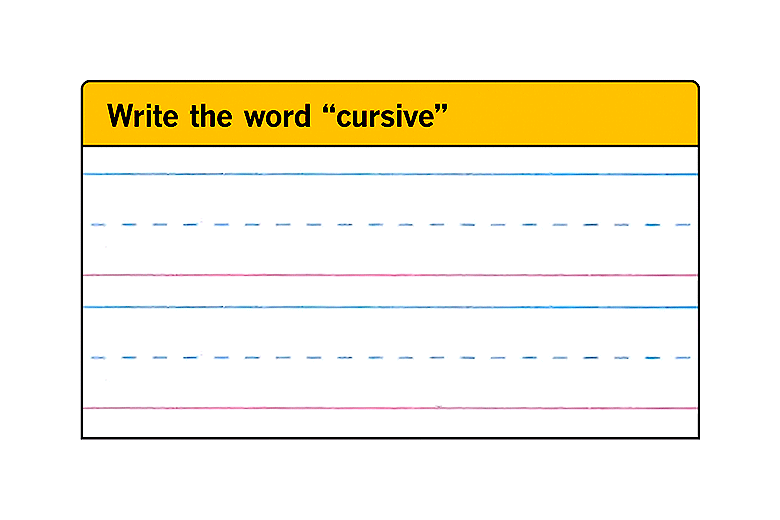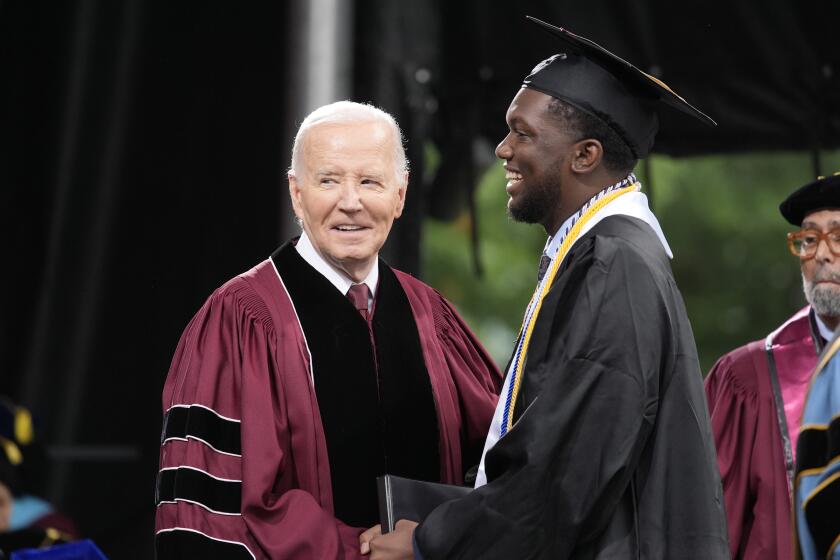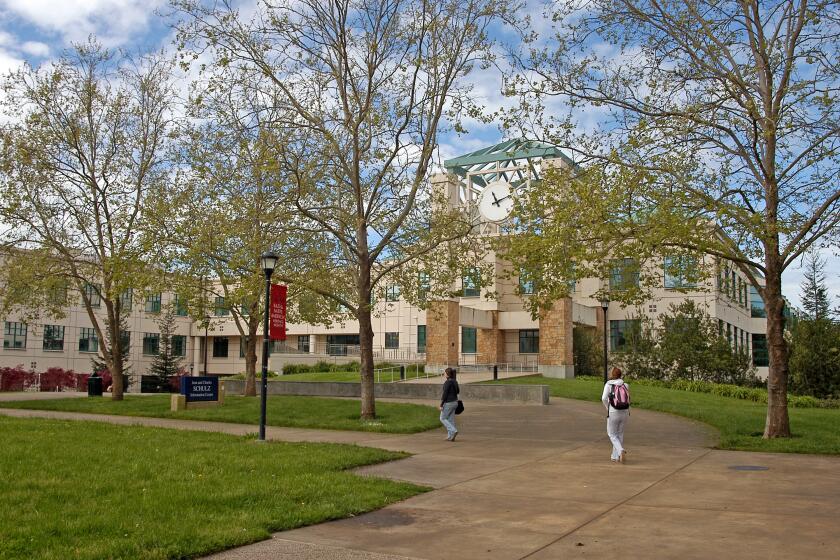Range of Institutions Tackles Reading Problems
The people who need the information in this article cannot get it directly.
Because they live behind the barrier of illiteracy, the flow of printed information to them is always controlled by others--those who can read.
Chances are you know at least one of the 23 million illiterate Americans: the mother who can’t read the word poison on a bottle; the father who can’t help his child with third-grade homework; the high school graduate who can’t read a job application.
According to authorities, illiteracy sometimes can be traced to brain or perceptual dysfunctions. However, more often, its victims simply failed to learn to read and write in school, they say.
Many illiterates, burdened by guilt or shame, keep their deficiency a secret. Juanita Stanley, executive director of California Literary Inc., says: “Somewhere along the way, they become ashamed to admit, ‘I don’t know how.’ So in desperation, they start faking it. One day, though, it gets too hard to go on. That’s the crisis point at which many seek help.”
Stanley’s group is a nonprofit, statewide organization formed 30 years ago. California Literacy sets up sites and trains volunteer tutors in the phonics-oriented Laubach Literacy Method.
In Southern California, the organization has 21 literacy councils with 100 centers (including some of the facilities listed below). A spokesman said the group can provide referrals for people with reading problems and for reading teachers seeking to affiliate with an institution. Call (818) 282-2196.
Referrals are also available from the Los Angeles County Public Library, (800) 372-6641, 9 a.m. to 6 p.m., Monday through Friday. It can provide names and telephone numbers of literacy agencies from San Diego to Ventura County.
Here’s a sampler of resources in the effort against illiteracy.
The Assn. of Educational Therapists, (818) 344-4712, can provide referrals to about 450 educational therapists. Association members are trained in special education to identify people with learning disabilities and to teach them academic skills for independent living. A spokesperson said each therapist sets his or her own fees.
One of the association’s therapists, Barbara Bennett of Santa Monica, (213) 394-7369, says: “I’ve dealt with successful people who depended on others to do their reading. But they became tired of skating on such thin ice.”
Like many of her colleagues, Bennett uses in-depth testing to assess a new client’s skills. Personal interests are noted and an individual program is designed. For example, one film producer used movie scripts to practice reading.
California Conservation Corps, 1530 Capitol Ave., Sacramento. Although the primary purpose of this state program for people 18 through 23 is protection of the natural environment, members are also required to attend academic classes. Indeed, says Susanne Levitsky, corps public information officer in Sacramento, “Many enlist for the academic program.”
Students spend several nights a week in the free classes, which offer academic studies or career-development training. A spokesman said that although the classes deal with a number of subjects, an important objective of the program is to develop reading and writing skills.
For additional information about the program and the locations of its facilities, call (800) 952-5627.
Computer Technology/Special Education/Rehabilitation Conference, Oct. 15-17, 9 a.m. to 4:30 p.m. at the Student Union at Cal State Northridge, 18111 Nordhoff St., Northridge. In part, the public conference will deal with programs designed to help computer users with all types of disabilities, including reading problems, and to help others assist illiterate friends or family members ranging from children to the elderly. Discussions and other activities at this third annual conference will address the reading issue. The fee for the event, sponsored by the university’s Office of Disabled Student Services, is $120. Call (818) 885-2578.
Glendale YWCA, 735 E. Lexington Drive, Glendale, (818) 242-4155; South Valley Unit of the YWCA of Los Angeles, 5703 Laurel Canyon Blvd., North Hollywood, (818) 766-1903.
The Glendale YWCA’s reading-and-writing program, administered by the Glendale YWCA
Literacy Council, offers individualized tutoring for people 21 and over. Class scheduling is arranged for the convenience of the student and tutor, with a minimum of 1 1/2 hours required each week. The only charge is for materials.
Joan Davis of the Glendale YWCA Literacy Council said: “Non-readers often feel they are the only ones with the problem; they are relieved to find they are not alone.”
Leanor Nickel, council treasurer, added that a class for tutors in reading and English as a second language is forming.
Mariam Hasan, director of the South Valley YWCA branch, said the unit’s literacy program uses 35 tutors to teach slightly more than 40 students, age 21 and over. She added that younger people sometimes are accepted after special consultation.
Classes are held at the Laurel Canyon Boulevard site and schedules are flexible, she said. Students must attend at least three hours a week. The program is free, but students must buy their workbooks.
Hasan said the reading program “is the most rewarding here at the Y: It’s exciting to see an illiterate individual come in and within three months become a different person.”
Grace United Methodist Church, 2325 East 3rd St., Long Beach, (213) 434-3702. Call between 1 and 4 p.m. Mondays or Wednesdays. This is one of many churches in the Southland whose facilities are used for literacy classes. The Long Beach Laubach Literacy Council, in operation since 1970, provides tutors who work individually with students 18 and older at the church. Children sometimes are accepted under special arrangement.
Occasionally, tutors will go to the home of a physically disabled student.
Sessions are free except for workbooks; under some circumstances, the materials can be provided at no cost or reduced cost.
Peter Ramirez, president of the council, says of the program: “Our students keep going on to more difficult reading. Over the years, the dropout rate has never been more than 10%.”
Ramirez added that a six-session training course for people seeking to become Laubach Literacy Council tutors will begin Oct. 13.
Learning Disability Program, Office of Disabled Student Services, Cal State Northridge, 18111 Nordhoff St., Northridge, (818) 885-2578. This is an example of the programs offered by institutions throughout the California State University system. Learning-disability specialists Jennifer Zvi and Marshall Raskind, both Ph.Ds, run the Northridge campus program, started in 1985. Currently it is assisting 130 learning-disabled students enrolled at the university.
Zvi says: “We provide support groups and special testing accommodations for students who run into problems after they are accepted within the university system.”
The program develops compensatory strategies to overcome problems, making it possible for bright students with learning disabilities or reading problems to make it through college, Zvi said.
Among the help available: free tutoring, books on audiotape, note-takers and readers.
Los Angeles City College, 855 N. Vermont Ave., Los Angeles, (213) 669-4000, Ext. 515. This is an example of the wide range of learning-skill and reading programs available for learning-disabled students at Southern California community colleges. Susan Ndefo, learning-disability specialist, said the LACC program is open to people 18 and over at a minimal cost, as low as $5 a semester. Even this fee can be waived in some cases, she said.
A person must be enrolled at LACC to take the courses, but, Ndefo added, one may enroll for only the reading and learning-disability program, which is open to students who have been tested and identified as learning disabled.
The broadly based program focuses on individualized tutoring, group study-skill classes and, in some cases, operation of computers that use spelling programs.
In addition, there are rap groups in which participants are urged to share problems related to learning disabilities.
Tutors are supervised by credentialed teachers.
Orton Dyslexia Society, Orange County Branch, P.O. Box 4263, Irvine, (714) 786-0344. This organization has branches throughout the United States and Canada, with five in Southern California. It disseminates information and promotes research for the learning disabled. Free meetings for adults are held at 7:30 p.m. the fourth Monday of each month at University Park Community Center, 4530 Sandburg Way, Irvine.
Language-skills seminars, which run for eight weeks, are given in Irvine four times a year--from 7 to 9 Tuesday and Thursday evenings at University High School, Campus Drive at University Drive in Irvine. The cost is $250 per eight-week series.
Orton Dyslexia groups also sponsor rap sessions, support groups, parent groups, teacher-training workshops and conferences for people with dyslexia and their families.
Joan McNichols, an official of the society’s Orange County branch, defined dyslexia as a specific learning disability that is neurologically based and can impair reading, writing, spelling and sometimes mathematical abilities.
Placerita Junior High School, 25015 Newhall Ave., Newhall; call Alice Gault, director of the Saugus Literacy Council, at (805) 252-7892. The classes, for adults, are held Tuesdays and Thursdays from 7 to 9 p.m. The Saugus Literacy Center, in operation for 18 years, coordinates this and other programs with the Golden Oak Adult School. Classes are administered by a credentialed teacher, paid aides and volunteer tutors. There is no charge for classes, but a student workbook has to be purchased.
Project Literacy United States (PLUS) is an information/referral clearinghouse. Call (800) 228-8813 from 6 a.m. to 3 p.m. Monday through Friday.
The 7-year-old Nebraska-based organization, in addition to providing free lists of literacy resources for various areas of the country, offers free literature on literacy, learning disabilities in adults and children, methods by which a lay person may tutor an illiterate member of his or her family, and passing high school equivalency tests. It also makes available information on how to form a literacy program.
A spokeswoman said that Los Angeles-area callers who are seeking referrals to local resources usually are given the phone numbers of California Literacy Inc. or the L.A. County Public Library information line, both listed above.
She added that the listings offered by PLUS cover more than 8,000 literacy programs nationwide.
More to Read
Start your day right
Sign up for Essential California for news, features and recommendations from the L.A. Times and beyond in your inbox six days a week.
You may occasionally receive promotional content from the Los Angeles Times.





